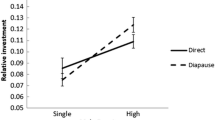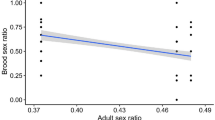Abstract
Recent evidence has revealed an apparently high degree of control by female birds over the physiological aspects of their reproduction and offspring sex allocation, consistent with adaptive hypotheses of sex allocation and differential investment in their offspring. In the house sparrow, we investigated possible mechanisms that may be used by females to enhance the fitness returns from a reproductive effort. Using molecular techniques, we demonstrate that house sparrow eggs containing male embryos are significantly larger than those containing female embryos. We also found that male embryos were laid randomly with respect to laying order. We speculate that this sexual dimorphism of eggs is adaptive, because male house sparrows show greater variance in condition-dependent reproductive success than females. More important, the result provides further evidence of the ability of females to detect or control ovulation of either male or female ova and to differentially invest in one sex over the other.
Similar content being viewed by others
Author information
Authors and Affiliations
Additional information
Received: 19 January 2000 / Revised: 29 June 2000 / Accepted 20 July 2000
Rights and permissions
About this article
Cite this article
Cordero, P., Griffith, S., Aparicio, J. et al. Sexual dimorphism in house sparrow eggs. Behav Ecol Sociobiol 48, 353–357 (2000). https://doi.org/10.1007/s002650000252
Issue Date:
DOI: https://doi.org/10.1007/s002650000252




